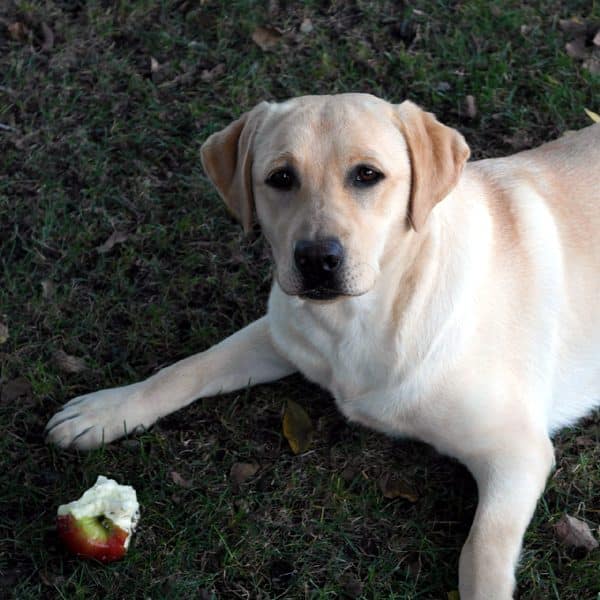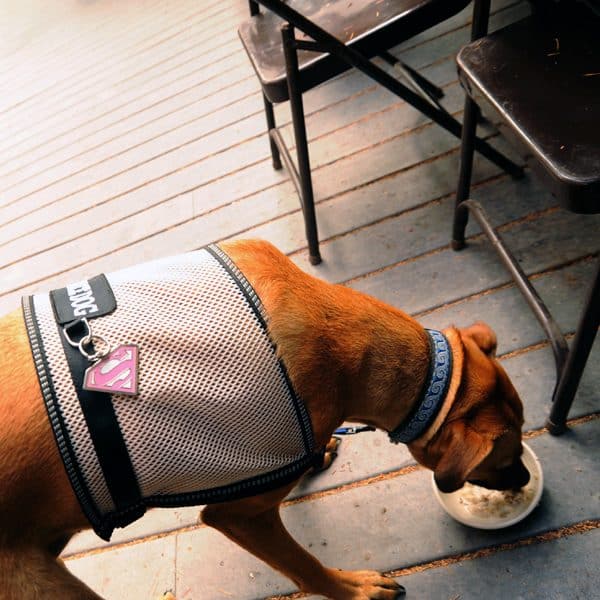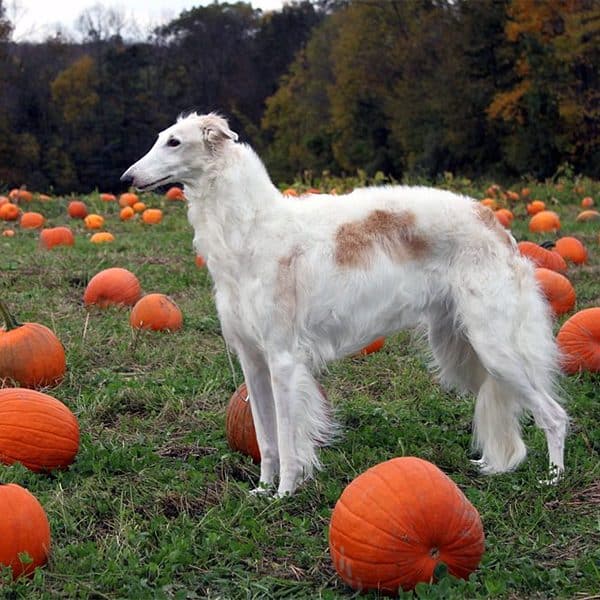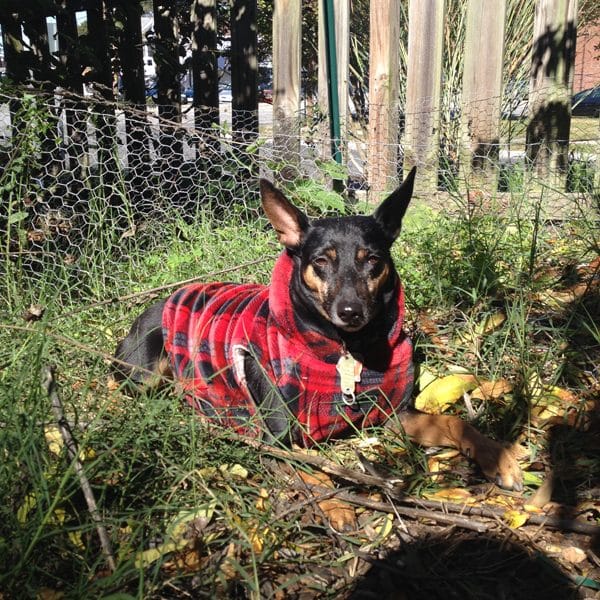Every Saturday, I help my friends Rochelle and Will work on their urban farm here in Durham, North Carolina. A few weeks ago, Rochelle said our task for the day was to get the fall vegetables planted. To a large extent, fall fruits and veggies are those whose period of growth is rapid enough that they can be put in the ground after the summer harvest and ripen before the year’s first frost. The tiny farm dog, Sugar, joins us outdoors on many farm days. Is any of the produce we grow on the urban farm fit for canine consumption once the crop comes in?

Are apples good for dogs? (Photo via Pixabay)
Are fall harvest fruits and veggies safe for dogs to eat? Let’s take a look at a representative sampling, including such autumnal favorites as:
- Apples
- Beets
- Broccoli
- Cabbage
- Cauliflower
- Green beans
- Kale
- Lettuce
- Oats
- Pumpkins
- Radishes
- Spinach
- Sweet potatoes
- Zucchini
Can dogs eat apples?
While apple stems and seeds have very small amounts of Amygdalin — a chemical compound that breaks down into cyanide when pulverized and digested — the seeds are so durable, and your dog would have to eat so many, that they present no real danger. All the same, wash the skin of an apple thoroughly to remove any lingering chemical treatments and cut the fruit into easily chewed slices. Note that too much of any sweet fruit can cause temporary stomach upset.
Can dogs eat beets?
According to every source I consulted, including the ASPCA, beets are non-toxic for dogs. Fresh, washed, and home-prepared beets are always going to be preferable to canned. This is due to the presence of added salt and preservatives, which may bother your dog’s digestive system. According to one vet, repeated beet eating by dogs may perform a slight dye job on their hair and skin, but no adverse effects!
Can dogs eat broccoli?
We’ve covered broccoli and dogs previously. Cooked or boiled broccoli, free of spices, cheese, or that ranch dip you love, is safe, as is raw. With raw broccoli, though, keep the amount small; the heads, or florets, of broccoli contain a chemical that can cause stomach irritation when released during digestion.
Can dogs eat cabbage?
Once, for St. Patrick’s Day, I asked whether corned beef and cabbage, a traditional holiday repast, was safe to share with dogs. For its own part, cabbage is perfectly safe for dogs to eat in limited portions. The severest consequence of too much cabbage is swelling of the thyroid, and the least seemly is an uptick in your dog’s flatulence.

Prepared simply, oatmeal is good for dogs. (Photo by Wonderlane on Flickr)
Can dogs eat cauliflower?
Several of the vegetables on our list — cauliflower, cabbage, broccoli, and kale, are members of the Brassicaceae family of flowering plants. Like the broccoli it so closely resembles, cauliflower presents the same antioxidant benefits — limited though they are — and the amount that a dog can eat safely before affecting a dog’s digestive regularity is equally small.
Can dogs eat green beans?
On an episode of The West Wing, the White House Press Secretary had to stem controversy from Oregon farmers when the President said he didn’t care for green beans. There’s little to argue about with green beans; like many of the vegetables we’re looking at, in moderation and as an occasional treat, they are safe for dogs cooked simply or given raw. Possibly due to the crunch factor, dogs that do eat green beans seem to enjoy them raw.
Can dogs eat kale?
Kale is one of the fall vegetables we planted at the urban farm this year. Like its cousins and siblings in the Brassicaceae family, kale is safe for dogs in very small amounts. According to one Massachusetts veterinarian, kale should be avoided due to the risk of bladder and kidney stones in dogs, so use your best judgment and proceed with caution.
Can dogs eat lettuce?
As with any other vegetable which dogs are not accustomed to eating, lettuce may not be toxic to dogs, but that doesn’t mean you should stick a head of it in the dog bowl before you go to work in the morning. If your dog is constipated, many of the digestive “problems” presented by produce on our list might help move things along, but more of that when we get to oats and pumpkins.
Can dogs eat oats?
Prepared plainly, a bowl of oats has some digestive benefits for dogs, particularly those with bowel movement troubles. Always consult with your dog’s veterinarian before making wholesale changes to a dog’s normal diet. While oats and oatmeal are safe for dogs, keep raisins, sugar, and milk out of the dog’s bowl. While the dangers that raisins and grapes present to canine life and health are usually presented with apocalyptic alarmism, we’ll let it suffice to say that both should be kept away from dogs.
Can dogs eat pumpkin?
It has been long and widely acknowledged that pumpkin has definite benefits for dogs, especially those who are having temporary trouble executing successful bowel movements. Surprisingly little goes a long way. PetMD recommends only a tablespoon of pureed pumpkin mixed in with a dog’s regular food for relief of both diarrhea and constipation. Note that it should be as plain as possible, so pumpkin-pie filling is out, since it is typically saturated with sugars that may only exacerbate loose stools.

A tablespoon of pumpkin is safe for dogs, and can help digestion. (Photo via Wikimedia Commons)
Can dogs eat radishes?
Whether grown in your fall garden or fresh from the produce section of your local grocery, radishes are safe for dogs in small amounts. Sources allege that dogs may find the taste of a radish unpleasant, but like carrots, these tough, hardy veggies can also serve as natural chew toys and teeth cleansers for enterprising dogs. Let your dog steer clear of wild radishes and their flowers.
Can dogs eat spinach?
The presence of oxalates in spinach leads some people to hesitate, knowing that they play a role in kidney stone formation. Your dog would have to eat a truly outrageous amount of spinach to experience any adverse effects. A few leaves of fresh, well-rinsed, raw spinach may serve your dog well, just as a couple of leaves of lettuce will, as an occasional treat.
Can dogs eat sweet potatoes?
As long as the sweet potato is fully grown, matured, and prepared very simply, your dog may enjoy a bit of this fleshy orange fall vegetable. Boiled, baked, or even dehydrated sweet potato slices are safe for dogs to eat. They are high in carbohydrates, which dogs don’t need an excessive amount of in their diets. Keep your serving sizes small or limit the number of prepackaged sweet potato dog treats you offer your dogs.
Can dogs eat zucchini?
Finally, zucchini is both safe and healthy for dogs, whether served as frozen chunks, raw bits, or grated and sprinkled over a dog’s normal food. Even though they do not have the same kick as radishes, some dogs may wrinkle their noses at zucchini on first taste.

Sugar is a tiny dog who helps on the urban farm. (Photo by Melvin Peña)
None of the fall fruits or vegetables we’ve covered in this piece are toxic or dangerous to a dog’s health. Keep in mind that while dogs will certainly eat vegetable matter, it should never stand in for or completely replace a dog’s normal diet. Nor should you make any dramatic changes to your dog’s typical food, especially for health reasons, without first consulting a veterinarian. Also, though each of the items we’ve looked at is safe to give dogs, excess of any new food item can cause temporary digestive upset or gas discharge, so proceed with caution!
The post Can Dogs Eat Pumpkin? What About Other Fall Vegetables? appeared first on Dogster.
No comments:
Post a Comment